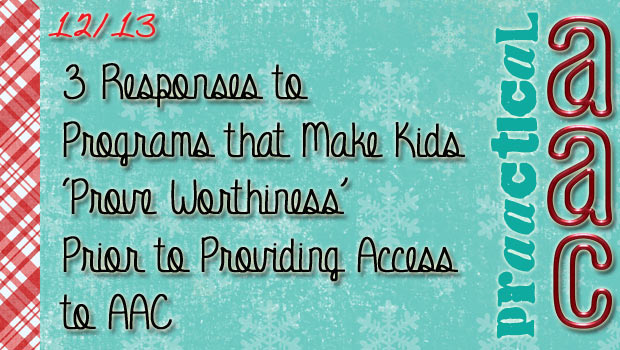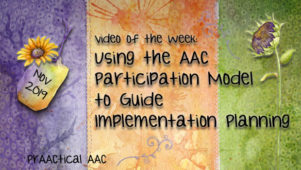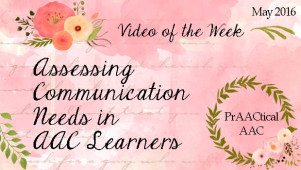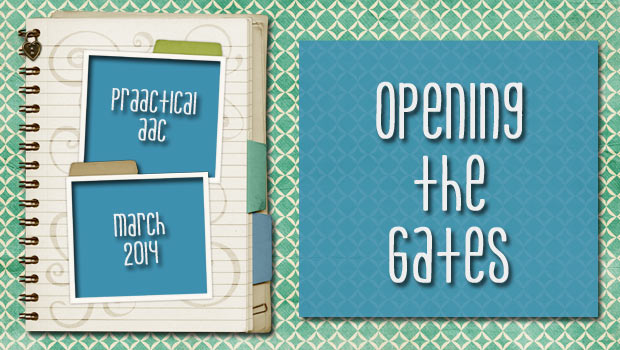3 Responses to Programs that Make Kids ‘Prove Worthiness’ Prior to Providing Access to AAC

Like many of you, we continue to hear about programs that withhold AAC supports from children who are nonverbal or minimally verbal. Sometimes they point to the perceived lack of readiness that the child has for AAC, in general. Other times, they erect barriers, such as an artificial benchmark that insists that children start with no-tech AAC (e.g., communication boards, books, PECS) or low tech SGDs before ‘earning the right’ to sophisticated AAC options.
As yet another year comes to a close, it is hard to believe that there are still programs, administrators, or, worse yet, our SLP colleagues who think they are truly justified in limiting access to AAC. How can we move beyond tearing our hair out, drinking excessively, or ranting to our friends? Here are some ideas.
“Show me the evidence.” Ask for empirical support for the position that withholding access to AAC tools and strategies is more efficacious than providing it. Access to communication is a fundamental right. Anything to the contrary should be well-supported by a research base or the consensus of experts.
“We’ve evolved.” It’s fine to ‘party like it’s 1999,’ but let’s not practice SLP that way. (Actually, the ‘prove readiness’ notion was outdated even then.) The Candidacy Model gave way to the Participation Model a few decades ago (Beukelman & Mirenda, 1998). For over 20 years, the field has acknowledged that there are no behavioral or cognitive prerequisites for learning AAC.
“Where’s the logic?” No one can learn language without at least being exposed to it. If we want nonverbal or minimally verbal kids to learn to use AAC to express themselves, they need access to the tools and the intervention that will permit this. The longer we withhold access to these things, the longer these kids are prevented from learning language.
Some of our prAACtical friends are too young to remember the poem My Other Brother, Daryl. In some respects, we’ve come a long way since then. And in others, the battle still rages.
::::::::::::::::::::::::::::::::::::::::
Beukelman, D., & Mirenda, P. (1998). Building opportunities and nonsymbolic communication. In D. Beukelman & P. Mirenda (Eds.), Augmentative and Alternative Communication (2nd Ed., pp. 265–294). Baltimore: Paul H. Brookes.
Filed under: PrAACtical Thinking
Tagged With: barrier, participation model, prerequisites, rationale
This post was written by Carole Zangari




6 Comments
First, let me say that I am a huge fan of yours. I follow each and every one of your blogs and relish them. I have learned so much from you! Your piece above is so profound. Thank you! This a priori judgement of perceived readiness is pervasive, and it extends beyond AAC; I wish I could say it is rare. I am facing this very issue in my SLP practice at the moment, i.e., justifying AAC options /low or no tech. Child with global delay is beginning PECS user and working on speech acquisition. I have come into the home for a home program, and have made the case that communication goals are primary. I would greatly benefit from mentorship – would you be willing to talk to me? Thanks for all you contribute so generously.
Thank you for this It has taken me till my son was in primary 7 to secure an i-pad with communication app and your so right SLP demand they can do PECS before accessing ACC device which I feel is wrong on every level hopefully me sharing this with our school group will encourage them to fight to give their child a voice. Some of the Children are much younger than my son so sooner they start the better. Thanks Again.
Glad the information was helpful, Lesley. Many times, the SLPs graduated from programs which did not teach AAC skills and really weren’t given the information or tools they need to serve ‘our’ kids well. Some of us are working hard to change that, but it is long process to impact change. Looking forward to a day where all SLPs get good preparation in this area!
Could you please point me in the right direction ? My 5 year old son attends mainstream school but has never used any sort of communication device , we have a Tobin I 12 which I am hoping he will use soon flex to communicate as he has no problem navigating the screen for gaming he is somewhat verbal like mom no ya etc but the clarity isn’t ther. Cognitively he is 100% it’s purely physical as he has cerebral palsy so from that point of view …where do start ? I have no alt to help mo as he doesn’t receive therapies thank you for any guidance
practial is not aac it is s2c check it out i dare you